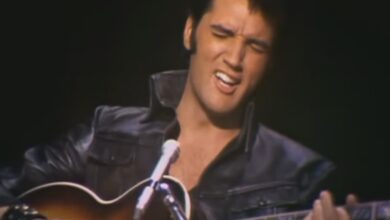His Heart Was Fully in His Singing, Finding Joy in It; Singing Gospel Would Have Caused Less Strain
“Bosom of Abraham,” recorded by Elvis Presley in 1971, is a striking representation of his deep connection to gospel music. This track was part of the album “He Touched Me,” which holds a special place in his discography as it showcases his spiritual exploration and passion for gospel themes. The song’s lyrics draw heavily from biblical scriptures, particularly Luke 16:22, ensuring that the message resonates with a broader audience familiar with Christian teachings. This particular verse refers to the comforting imagery of “Abraham’s bosom,” which symbolizes a place of rest and peace for the faithful—an idea that Elvis beautifully encapsulates through his vocal delivery.
The upbeat and lively nature of “Bosom of Abraham” reflects the foundational elements of gospel music, which often seeks to uplift and inspire. The rhythm sections work in harmony with Elvis’s powerful voice, creating a sound that invites listeners to join in joy and celebration. The inclusion of backing vocalists adds depth to the track, further enhancing the joyous atmosphere and collectively expressing a faith-filled message. This communal sound is reminiscent of traditional gospel performances, where the assembly of voices serves to amplify the shared experience of worship and praise.
Elvis’s appreciation for gospel music was deeply rooted in his upbringing. Raised in the rich cultural tapestry of the Southern United States, he was exposed to gospel hymns from an early age. This genre not only shaped his musical style but also influenced his spiritual life. Throughout his career, he recorded numerous gospel songs, making contributions that resonate with fans of Christian music, in addition to his broader rock and roll works. “He Touched Me,” the album that features “Bosom of Abraham,” won a Grammy Award for Best Inspirational Performance, highlighting Elvis’s impact on the genre.
In “Bosom of Abraham,” the lyrics resonate with a message of hope and assurance. The portrayal of finding solace in the embrace of a divine figure speaks to the human desire for security and peace, especially in times of uncertainty. Elvis’s rendition is not merely a performance; it is an emotional expression that allows listeners to connect with their own experiences and beliefs. Through the song, he articulates a universal longing for comfort, reinforcing the idea that music has the power to heal and uplift.
Moreover, Elvis’s musical versatility is evident in his ability to traverse various genres while instilling his unique style into every performance. His gospel recordings, including “Bosom of Abraham,” illustrate his capacity to convey profound spiritual messages while still appealing to a vast audience. The blend of traditional gospel elements with his charismatic rock and roll flair showcases the seamless way he could navigate different musical landscapes, appealing to both devout listeners and broader music fans.
Elvis’s legacy as a musician has consistently been intertwined with themes of faith and redemption. His gospel music, particularly numbers like “Bosom of Abraham,” played a critical role in shaping his identity as an artist who sought not only commercial success but also a meaningful connection with his audience. The sincerity he brought to his recordings continues to resonate, allowing new generations to discover the spiritual depth within his music.
In addition to his musical achievements, Elvis’s personal journey adds to the significance of songs like “Bosom of Abraham.” Faced with the trials and tribulations of fame, he often turned to music as a form of solace and expression. Thus, the themes in his gospel songs can be viewed not only as reflections of his artistic vision but also as expressions of his own inner life and value system.
Ultimately, “Bosom of Abraham” stands as a testament to Elvis Presley’s enduring influence in both gospel music and popular culture. It embodies his ability to transcend the confines of genre, capturing the hearts of listeners who find resonance in its message of hope and comfort. The song, like much of his gospel work, invites individuals to reflect on their faith while experiencing the joy and energy of well-crafted music.
Through its upbeat tempo and poignant lyrics, “Bosom of Abraham” highlights the profound impact of gospel music on both the artist and the audience. Elvis Presley’s legacy as a gospel singer, amplified through such tracks, underscores the genre’s ability to forge connections that transcend time and space, making the music relevant to contemporary audiences who seek inspiration and spiritual fulfillment in their daily lives. As such, “Bosom of Abraham” is more than a mere recording; it is a bridge connecting the past with the present, inviting all into the embrace of musical harmony and divine compassion.



